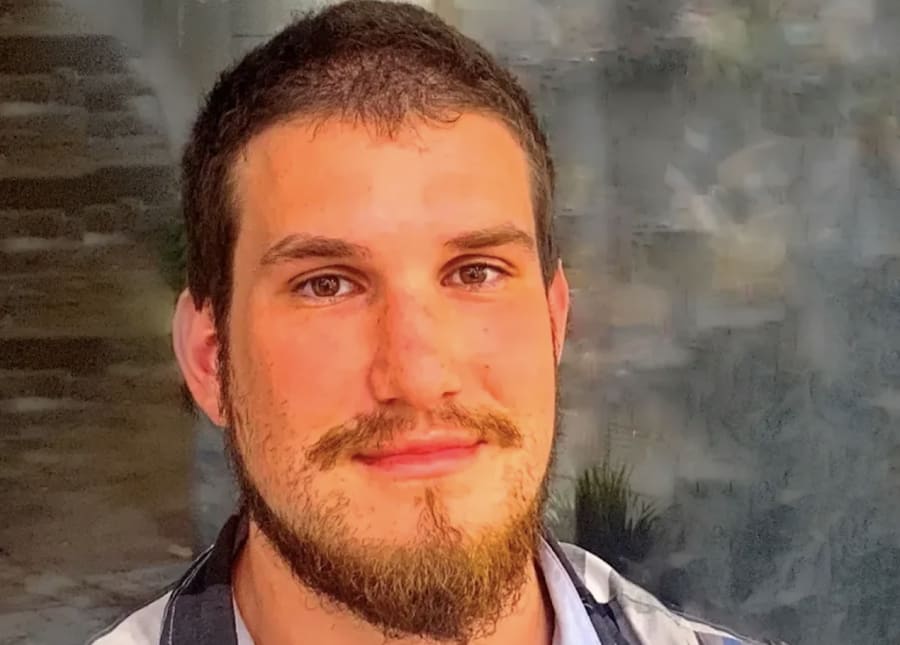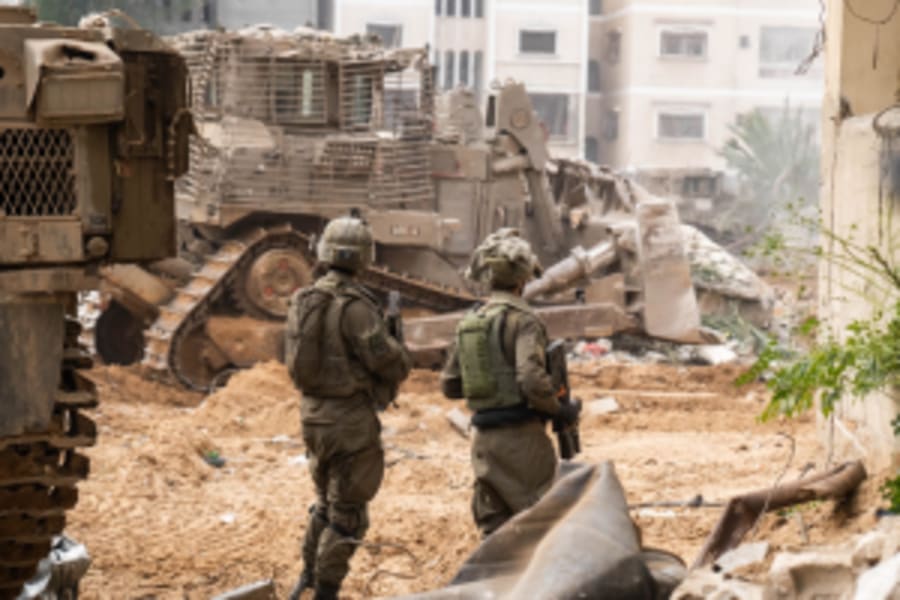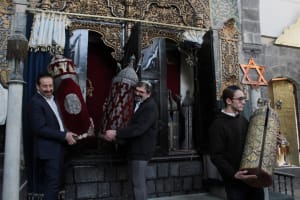Christian immigrant shares his story of faith and perseverance amid serious injuries while serving in the IDF
B. went from being an elite athlete in Hungary to fighting in an elite IDF unit in Gaza

Sitting across from us is a smiling, large man who used to be a linebacker in the Fradi handball team. However, instead of pursuing elite sports, he shifted to another profession – a calling, you could say. He underwent training with the IDF and participated in operations in Gaza.
Currently recovering from a serious injury, he faces a decision...
B: I made aliyah (immigrated) officially, and I am now an Israeli citizen.
Was it okay for you to be a Christian? Wasn't that a concern?
B: It was a concern initially. The authorities at Sochnut [Jewish Agency] were unsure about it because it's unusual for a Christian to make aliyah. Eventually, they asked for my papers, and since I have Jewish roots, it worked out. I never denied being a Christian, and my papers in Israel also list my religion as Christian.
When did you make aliyah?
B: In 2021. I began by learning Hebrew. My life in Israel started with an ulpan in Kibbutz Maagan Michael, near Caesarea. I spent half a year there, mainly focusing on studying and physical training for the army.
With your background as an elite athlete, wasn't that enough?
B: I went through special unit training, a rigorous preparation program led by a former combatant from the Israeli Marines' special unit, Shayet 13. This training at Maagan Michael included 3-4 sessions per week and it was incredibly challenging. My physical endurance improved significantly compared to my handball career.
Was there such a significant difference in preparing for the military compared to sports?
B: The training cannot be compared to anything I experienced before. I can only compare it to my toughest years with Fradi when I had eight training sessions a week. However, the intensity of what we did in the military training was equivalent to three workouts there.
Did you know you were going to be a soldier?
B: That was the plan. I came to make aliyah and enlist.
Did you want to be a professional soldier?
B: No, I never wanted to be a professional soldier. I enlisted as a volunteer.
Did you make friends during the training?
B: Of course! First, I spent a year learning the language and got to know many new immigrants, especially people my age. During the military training, I formed strong bonds with Israelis despite being the only new immigrant in my company.
What was your civilian job in Hungary?
B: I was an athlete. In addition, I have a carpentry qualification.
What are your plans after the military?
B: I want to study and improve my Hebrew. Now trained as a warrior, I might take more courses related to that. Eventually, I would like to volunteer at Magen David Adom, where they have a course for training nurses.
How were you injured?
B: My unit entered Gaza at the beginning of November. When we reached the Shejaiya area, that's when it happened. Our task was to occupy a school building used by Hamas. We succeeded, but then we had to cover other units so they could occupy assigned buildings. Meanwhile, a terrorist identified our position and fired an RPG rocket at us. The anti-tank shell penetrated the building, and shrapnel hit my upper body and thighs. One hit was more serious, piercing my left thigh. If it had gone further, I might have bled to death.
How effective was your uniform in protecting you?
B: My eyes were protected by goggles, and my ears by earmuffs. The vest covered the upper body effectively, but the tactical uniform was only effective against burns; shrapnel and bullets could penetrate it.
Were you the only one injured?
B: No, there were two of us in that guard room. The other guy was hit in the elbow by a larger piece of shrapnel, requiring surgery. As far as I know, his injury was not life-threatening, but his nerves were damaged, so his rehabilitation will take longer than mine.
What are your chances of recovery?
B: I'll be perfectly fine, I don't think there will be a problem.
And are you going back?
B: Whether I'll go back is uncertain because my term of service will end soon. Now, I have to decide whether to go back or extend.
If you don't go back, will you be put in reserve?
B: Yes.
What was your first thought when you were hit?
B: I can summarize it quickly. I went into instinctive survival mode. I didn't think about anything other than what I needed to do to survive the situation. My first thought was that I had been hit, and now I had to get up. When injured, you have to find a position that protects the injured area, get to a safe place, start treating the injury, and call for help. That's what I did. As soon as I got out of the place where I was injured, I threw myself on my stomach, called for help, and started to take care of myself.
Did the other guy get out with you?
B: He ran out. His leg was not injured, but I got out slower. The pain intensified, and I felt that it was a more serious injury because my whole thigh was wet with blood. It was difficult to apply a compression bandage, and I ended up in the hospital.
What was your first deployment like?
B: We were at our base on October 7, but in the first week, we were assigned to the south. First, we went to Sderot and then to Beeri. It's hard to forget. When we arrived, there were already many soldiers there, and there were even Hamas members in the area. We came to secure the area and protect it from potential attacks from Gaza and remaining terrorists. I think it took at least two weeks to clear the area. We started by searching houses, and then the empty zone between Gaza and the kibbutz had to be searched to ensure no one was left, and no equipment or explosives were abandoned.
Have you been involved in an armed conflict?
B. Not in Beeri, but later in Gaza.
Did you find any fugitives in hiding or those in need of care?
B: We didn't find any. We only encountered corpses and remains, remnants of people.
Were you prepared to be in such a situation?
B: When I enlisted, there was still peace, but I had to consider that when I became a soldier, there could be war. I believed and thought I would be suitable for it. In retrospect, yes, I was ready.
Was there no mental preparation in the army?
B: The entire basic training aims to prepare us both physically and mentally. We were aware that war could break out at any time. However, how well individuals could cope mentally varied based on their capacity and maturity.
For those who grow up here, the reality of war is more tangible, as they hear stories from their parents who were soldiers. However, coming here, you were new to war. How do you prepare for such a horrific situation?
B: I prepared myself for this. I can say that even though there is a continuous conflict in Israel, and there's a constant tension that something could break out, this doesn't prepare you for war. The events on October 7 were one of the greatest disasters in Israel's history. I don't think anyone was truly prepared for that.
During the last significant war, the 'Tzuk Eitan' in 2014, the guys I was with were still children, and it wasn't as serious as the first and second Lebanon wars. It wasn't much easier for them to deal with that situation either. What just happened on October 7 is one of the greatest disasters in Israel's history. I don't think it was possible to prepare for this.
How do you reconcile being a fighter with your Christian faith? The commandment is, 'Thou shalt not kill.'
B: The Bible says, 'Thou shalt not murder,' not 'Thou shalt not kill.' I couldn't judge the situation, as I wanted to surrender myself to the Lord's will. I condemn the events of October 7 as a crime against humanity. I'm not pleased with the civilian casualties. It's a difficult situation, very difficult. Thank God, I'm not the one to judge it.
I understand if someone wants to live in the Holy Land as a Christian...
B: I didn't have those desires. I just wanted to do what the Lord wanted me to do. I didn't overcomplicate it.
Did you suddenly come up with the idea of living in the Holy Land as a Christian?
B: I'd say it was more of a calling.
When was it?
B: In the winter of 2020. I asked the Lord in prayer what kind of service I could do. It had been a topic of prayer for years. The answer, which I believe came through the Holy Spirit, was Israel and the army. I got these two words. Half a year later, I successfully made aliyah.
You mentioned you were raised as an atheist. At what age did you come to faith?
B: I came to faith around the age of 20 or 21 in a small church of a Reformed community. A childhood friend led me to this church, and together we deepened our knowledge of the Word and the Bible. The pastor, assistant pastor, and the community helped me. After many questions, I gradually came to the point where I believed that Jesus Christ is the Messiah, the savior who died for my sins. It was a tough journey.
Do you miss your previous community, going to church?
B: I won't say I don't miss it. In recent years, I've found great strength to endure difficulties. I attended a church here recently, a Messianic Jewish community, and had a positive experience. I'll go back. It's also beneficial for learning Hebrew; the pastor explains the Word of God very clearly.
As you mentioned, you're now faced with a decision to go back and extend your service or be decommissioned when your time is up.
B: Certainly, I'm affected by what's happening in Israel, but for now, I'm trying to completely surrender myself to the Lord's will. If He wants me to go back, I'll go back; if not, I won't.
How will you know His intentions?
B: From God’s Word.
This article originally appeared here and is reposted with permission.

Izraelinfo.com is a non-profit, independent online news magazine. It publishes original news related to Israel, thought-provoking, critical and sometimes controversial opinion articles and essays.













